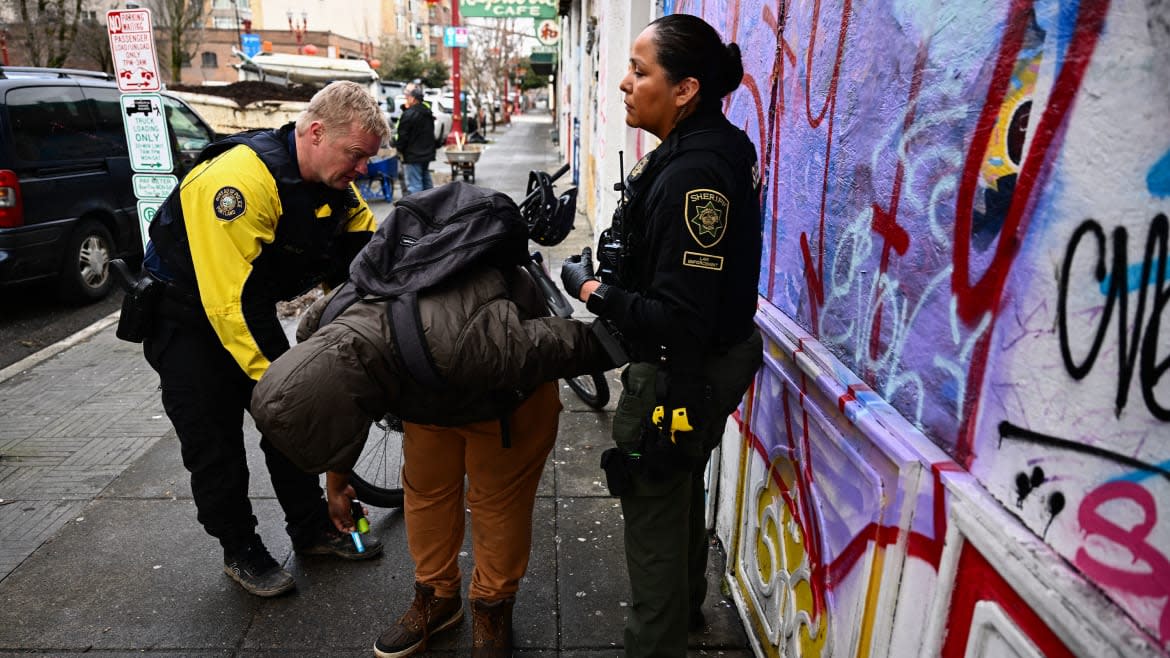Oregon’s Making a Terrible Mistake in Rebooting the Drug War

State legislators in Oregon just voted to reinstate the war on drugs.
The state Senate on Friday affirmed the House’s previous vote to re-criminalize drugs, after a months-long, coordinated disinformation campaign to scapegoat drug decriminalization—known locally as Measure 110—for their own failures. The bill, HB 4002, now heads to Gov. Tina Kotek’s desk.
When it comes to covering drug policy, it is clear facts don’t matter. The truth is that politicians seeking reelection have been hellbent on hiding this fact from you: decriminalization works.
Tax Legal Weed and Give the Money to Drug War Victims
Drug decriminalization via Measure 110 made progress towards its goal of decreasing the harms of criminalization, and the barriers to jobs and housing that come with a criminal record. It prevented tens of thousands of arrests, saving Oregon nearly $40 million in criminal legal system costs—savings used to help Oregon start to fill its gap in effective addiction services. Measure 110 also invested an additional $302 million from marijuana tax revenue towards addiction services, resulting in over a 100 percent increase in people accessing services they need, including substance use disorder treatment, housing, and overdose prevention.
Even the proponents of its repeal have admitted that Measure 110 was successful in this regard—agreeing the services it created must stay in place.
That doesn’t make the public suffering we see in places like Portland any less tragic. But it is one of politicians’ own making—their chronic underfunding of effective addiction services, affordable housing, and accessible health care are to blame. Put a national overdose epidemic—exacerbated by the spread of fentanyl—on top of that reality and you have the disaster we are witnessing.
Counter to what opponents of Measure 110 would have you believe, government inaction is fueling the “public disorder” that continues to put our collective safety at risk.
There is no evidence supporting claims that decriminalization increased homelessness, overdose, or crime rates.
Measure 110 was implemented against the end of COVID-19 eviction protections, a rising cost and limited supply of housing, and Oregon’s second-highest rate of homelessness in the country. Measure 110 funds helped people get off the streets with sober housing and extended housing periods for people going through treatment.
But these funds alone were not going to solve—nor were they ever meant to solve—the homelessness crisis in Oregon. More investment is needed.
Our lawmakers’ inability to enact housing solutions put people on the street, not drug decriminalization. When an existing homelessness crisis meets a lack of affordable housing—and lack of supportive spaces and services—public drug use will inevitably increase. Homelessness is often a catalyst for drug use. People experiencing homelessness may increase drug use to cope with trauma of being homeless, including to stay awake and alert as a protective measure.
Convicted DEA Agent Says He and Others Swindled the Government in ‘Very Fun’ Drug War
Several studies have also shown no association between Measure 110 and fatal overdose rates. Oregon’s overdose deaths remain close to the national average and far less than states like West Virginia or Tennessee, despite being the only state to decriminalize drugs. And there is simply no research to substantiate claims that Measure 110 is associated with any changes in crime. In fact, crime in Oregon was 14 percent lower in 2023 than it was in 2020.
Decision makers have dropped the ball on prioritizing, understanding, and addressing the overlapping crises of homelessness, poverty, and addiction. And they dropped the ball on Measure 110 implementation. Now they need to distract voters from the chaos they have caused.
This recriminalization is dangerous. We’ve been down this road before. More than 50 years of evidence demonstrates that locking people up for possessing drugs or forcing them into court-ordered programs does not end drug use, but it does increase harms, including death.
People experience tortuous withdrawals and overdose when in jail or prison. The treatment they are promised is either non-existent or ineffective. Only one in 13 people arrested with a substance use disorder receive treatment while in jail or prison. Drug and alcohol overdose deaths have more than doubled in jails and prisons. Those who make it out alive are 27 times more likely to die from an overdose within two weeks of release compared to the general population.
Throwing people in jail for drug use doesn’t make our streets safer, it temporarily hides people from public view until they end up back on the street.
An important part of the puzzle to reduce suffering is to end criminalization and the barriers it creates.
Our elected officials need to prioritize real solutions: increasing street outreach, offering more housing and humane shelter, and creating community-led crisis response teams that effectively connect people to care.
Ron DeSantis Wants You to Be Scared Senseless About Crime (Don’t Be)
How people are engaged and connected to services matter—for services providers to be conduits of care, they need more resources and funding. We need more accessible, effective, and voluntary addiction services with access to medications that cut opioid cravings and reduce overdose risk. We also need overdose prevention centers that can help bring drug use off the streets and into facilities run by experts, while connecting people to care.
We know that people suffering need more support, not punishment. We have all the data and research to back us up. Politicians know it, and now so do you.
Any politician increasing criminalization for drug possession is trying to hide the people they have harmed, not solve the problems they have created. We will not stand idly by while they shield their incompetence by rolling back the progress we’ve made to heal and restore safety to communities who need it now more than ever.
They can keep trying, but we won’t stop until criminalization does.
Get the Daily Beast's biggest scoops and scandals delivered right to your inbox. Sign up now.
Stay informed and gain unlimited access to the Daily Beast's unmatched reporting. Subscribe now.


